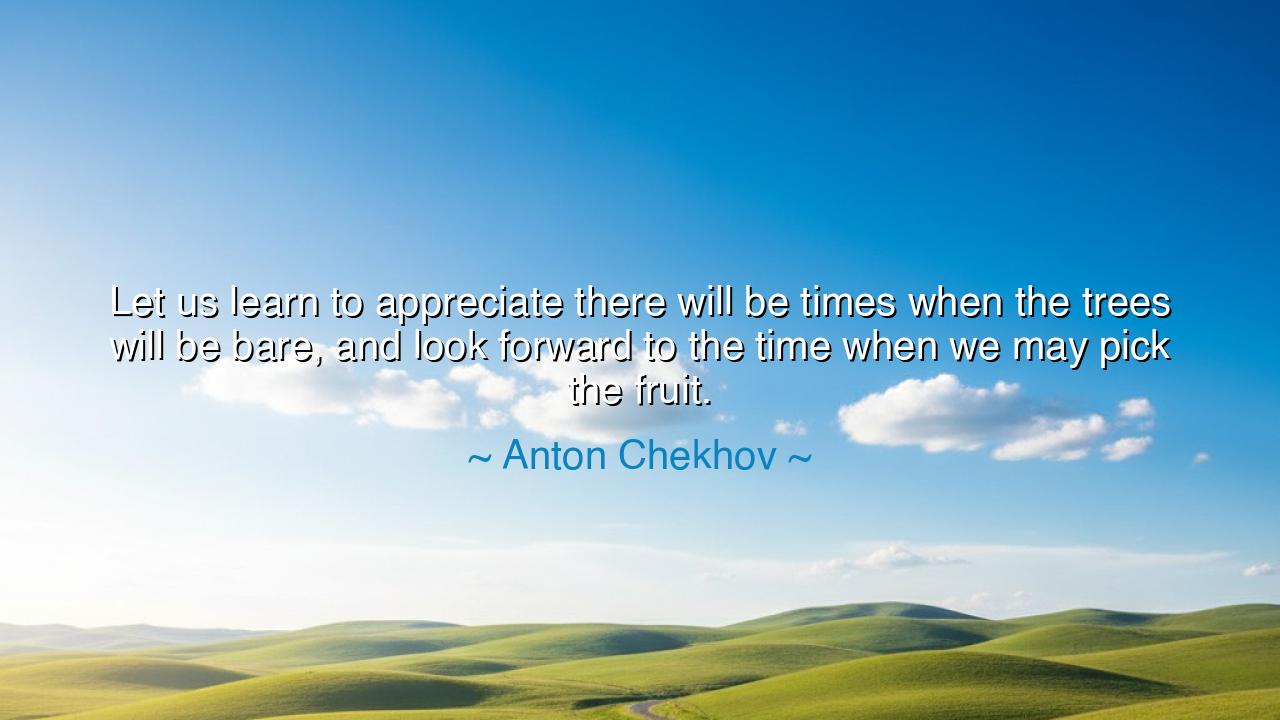
Let us learn to appreciate there will be times when the trees
Let us learn to appreciate there will be times when the trees will be bare, and look forward to the time when we may pick the fruit.






Anton Chekhov once wrote: “Let us learn to appreciate there will be times when the trees will be bare, and look forward to the time when we may pick the fruit.” In this quiet yet profound reflection, he reminds us of the rhythm of life—its winters and its harvests, its seasons of emptiness and its seasons of plenty. The bare tree is not a sign of death, but of waiting, of preparation, of unseen growth beneath the soil. The fruit does not come at once, but in its own season, when patience has been exercised and endurance has been proven.
The origin of this thought lies in Chekhov’s deep sensitivity to the patterns of both nature and human existence. Living in Russia, where winters were long and harsh, he would have seen countless landscapes of bare trees, stripped of their beauty and fruit. Yet he also knew that spring and summer would always return, and that the fruit would be gathered in its time. From this, he drew a metaphor for the human soul: that in life there will be times of emptiness, hardship, and seeming loss, but these too are part of the great cycle. To despair in winter is to forget the promise of harvest.
The ancients understood this law of seasons well. Ecclesiastes declared: “To everything there is a season, and a time to every purpose under heaven.” The Stoics taught that adversity and trial are not curses, but the necessary winters of the soul, preparing it for future strength. Even the myths of Persephone, who must descend into the underworld, teach that barrenness precedes renewal. Chekhov’s words join this lineage, urging us to appreciate both the winters and the harvests, both the bareness and the bounty, for without one the other could not exist.
History gives us vivid examples of this truth. Consider Nelson Mandela, who endured 27 long years in prison—a season of life when his branches were stripped, when the tree appeared barren. Yet he did not despair. He held fast to the knowledge that winter would pass, and when freedom came, the fruit of patience and perseverance nourished a nation. Or think of Abraham Lincoln, who faced repeated failures in politics and personal loss before he rose to lead a country. His barren seasons were not the end, but the necessary soil from which greatness would bloom.
The meaning of Chekhov’s words is deeply practical. He calls us not only to endure hardship but to appreciate it. To see in the bare tree not only absence but promise, not only loss but preparation. For just as the tree in winter gathers its strength beneath the ground, so too do we gather unseen wisdom, resilience, and humility in our times of barrenness. And when the season turns, and the fruit appears, we may pick it with gratitude, knowing it was made sweeter by the waiting.
The lesson for us is clear: do not despair in your winters. When life feels empty, when efforts seem fruitless, when hope grows thin, remember the trees. They endure their bareness not with bitterness but with quiet strength, awaiting the time of fruitfulness. So too must we. Embrace the seasons of waiting as part of the journey, and trust that every winter is followed by spring, every barrenness by renewal.
In practice, this means cultivating patience and perspective. When trials come, do not curse them but ask what roots you may be growing in the silence. When opportunities are scarce, use the time to prepare, to learn, to deepen your soul. And when harvest comes, do not forget the winters that prepared you for abundance. Live with gratitude in both seasons, for both are gifts of life.
Therefore, remember Chekhov’s wisdom: “Let us learn to appreciate there will be times when the trees will be bare, and look forward to the time when we may pick the fruit.” These words are not only about patience but about hope. They teach us to endure with faith, to wait with strength, and to rejoice when the harvest arrives. For life is not only about fruit—it is also about the bareness that makes the fruit possible, and the wisdom we gain by learning to love both.






AAdministratorAdministrator
Welcome, honored guests. Please leave a comment, we will respond soon